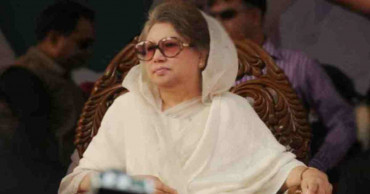Medical board
Khaleda’s treatment: No options available in Bangladesh, still has time to send her abroad: Medical Board
The medical board at Evercare Hospital on Monday recommended that BNP chairperson Khaleda Zia be urgently sent to a multidisciplinary center abroad soon as there are now no treatment options available for her in Bangladesh.
Speaking at a press conference at the hospital, the board also said the 78-year-old former prime minister’s life is at risk because of a lack of proper treatment to stop water accretion in her stomach and chest, internal bleeding and infections caused by her liver cirrhosis problem.
“Begum Khaleda Zia has been admitted here for the fourth time…her condition is complicated,” the chief of the medical board, Dr Shahabuddin Talukder, said.
Read: Khaleda’s doctors to hold press conference on ex-PM's condition Monday
He said a critical patient like Khaleda could collapse suddenly as she has been suffering from various diseases.
“Madam (Khaleda) has heart disease with a stent (placed into a coronary artery) and two blockages. So, there’s a chance of collapsing when the fluid is removed (from her stomach and lungs). She had to be taken to the CCU to get the water out. This is the reality,” he said.
Dr FM Siddique, a member of the medical board, said the BNP chairperson is not getting the treatment she needs at the moment for liver cirrhosis.
He said, “We’ve done all that we can. She needs to be taken to any advanced centre abroad for necessary treatment.”
Siddique said the opposition BNP chief’s condition is gradually worsening because of a lack of “proper treatment.”
Read: No politics behind denying permission for Khaleda’s treatment abroad: Law Minister
He said Khaleda is now facing water accretion in her stomach and chest, infections, and a small amount of bleeding in her stomach.
“This time she was given four bags of blood in the hospital. The actual situation is very complex and difficult. We have now reached a situation where we have no more option to treat her (in the country),” the physician said.
He lamented that a curable disease cannot be treated in the country due to lack of an advanced medical centre in Bangladesh.
Siddique said though Khaleda’s condition is slowly getting worse, the time is not over yet to treat her abroad.
“As per the medical board’s unanimous decision, I want to convey to all concerned that there’s still time to treat her with the transjugular intrahepatic portosystemic shunt (TIPS) and also to transplant her liver at any advanced multidisciplinary center abroad. Perhaps, we still have this option to improve her condition,” the doctor said.
He said TIPS is necessary immediately to stop water from accumulating in her stomach and chest and internal bleeding. “TIPS is a live savings procedure which is not available in Bangladesh. Liver transplantation is also not possible in Bangladesh either."
Another medical board member Professor AKM Mohsin said liver transplantation cannot be done in Bangladesh for lack of required setup, equipment, and manpower.
“One or two livers were transplanted here (Bangladesh) on an experimental basis. But we don't have the setup and required manpower for liver transplantation here. We don't have such surgery here," he said.
Mentioning that Khaleda Zia's condition is critical, Prof Mohsin said there is no setup in Bangladesh for her treatment with TRIPS and for her liver transplantation.
Professor Nuruddin Ahmed, another medical board member said the BNP chief has been suffering from many diseases, including liver cirrhosis. “Liver cirrhosis causes many serious complications such as abdominal bleeding and water accretion in her stomach and chest.”
He said infection caused by ascites is also a serious complication that put Khaleda’s life at risk.
Ahmed voiced concern that high doses of antibiotics are not working on Khaleda due to their frequent use. "In his critical condition, we are not allowing her to be taken home as carious complications and infections are appearing.”
BNP Chairperson Khaleda Zia has been undergoing treatment at Evercare Hospital in Dhaka under the supervision of a 15-member medical board, led by a specialist doctor, Professor Shahabuddin Talukder, since August 9.
She has been suffering from various ailments, including liver cirrhosis, arthritis, diabetes, kidney, lung, heart, and eye problems.
On September 5, Khaleda’s brother Shamim Iskandar submitted an application to the government, seeking her unconditional release and permission to take her abroad for treatment at an “advanced medical center” on an urgent basis to save her life.
However, the law ministry denied permission to take her abroad for better treatment, suggesting that she must first return to jail to serve her graft sentence and then apply to the court to get permission in this regard.
Law Minister Anisul Huq said there is no chance to open the petition, which has already been disposed of as per Section 401 of the CrPC. “We gave the opinion that the petition disposed under Section 401 is a past and closed transaction. There is no other scope to open it,” he said.
Amid the coronavirus outbreak, the government freed Khaleda Zia from jail for six months through an executive order by suspending her sentence on March 25, 2020, with the condition that she would stay at her Gulshan house and would not leave the country. Later, the government extended the tenure of suspension of Khaleda’s sentence for the eighth time.
2 years ago
Khaleda returns home from hospital
BNP Chairperson Khaleda Zia returned home on Friday evening after a 14-day stay in the capital's Evercare Hospital for the treatment of her various health complications, including blockages in her arteries.
The BNP chief left the hospital at about 5:40pm and reached her Gulshan residence around 6:10pm.
Earlier at a press conference, the medical board formed to ensure Khaleda’s treatment at the hospital, said the ailing BNP chief was discharged from the hospital due to a risk of Covid infection as the virus cases are on the rise again in the country.
Dr Shahabuddin Talukder, the head of the medical board, said, "Madame (Khaleda) is still ill. But she’s now stable. We don’t want to keep her here (hospital) now amid the surge in Covid cases. There’s a chance of Covid and other infections if she now stays here.”
He also feared that her condition will be very critical if Khaleda gets a viral or bacterial infection. “That is why the full medical board has decided to release her from the hospital.”
The physician said if there is any complications further, she will be admitted to the hospital immediately.
“Bleeding complication is now a very challenging matter for her. As she has a liver cirrhosis problem, she is now at high risk of bleeding. We overcame her kidney complications. There are still two blockages in her coronary arteries,” he said.
Prof Shahabuddin said Khaleda will have to be kept under full monitoring though she is going to stay at home.
He said the doctors will ensure her proper treatment at her residence.
Replying to a question, Dr Shahabuddin said they identified three blockages, including a culprit one with 95 percent block, in the BNP chief’s arteries.
As per the international medical guideline practice, he said they set up a stent removing only the culprit blockage which was causing her chest pain and heart failure.
The physicians said the BNP chairperson was facing renal and heart failure while they were removing her blockage. “Her kidneys could have been totally shut down had we tried to remove two other blockages. That's why we didn't remove those blockages."
Also read: Khaleda to return home from hospital today
He also said they treated Khaleda by overcoming many challenges as she has liver cirrhosis, diabetes, kidney problem and other comorbidities. “We all were shaky while treating her due to various challenges.”
The doctor also said they might not save Khaleda if she was not taken to the hospital immediately in the early hours of June 10.
Another medical board member Professor AFM Siddiqui said the BNP chief has many critical illnesses, including renal failure, chances of bleeding and liver cirrhosis.
Stating that there is no treatment for liver cirrhosis in the country, he said they just stopped the bleeding spots through ligation. “But we have not been able to follow up on them. It’s becoming riskier to follow up now due to her cardiac condition.”
The physician said they have long been repeatedly talking about sending Khaleda to an advanced centre for her comprehensive treatment of all critical diseases. “We don’t have that kind of centre and measures. That is why we have been saying that her proper and complete treatment is not possible in our country.”
Dr AZM Zahid Hossain, a personal doctor of Khaleda, said the BNP chief and her family members thanked all, including doctors, nurses, paramedics and everyone involved with the management of the hospital, for providing her treatment with sincerity.
He said the BNP chief also urged the country’s people to pray for her speedy recovery.
Khaleda was admitted to Evercare Hospital on June 10 as she complained of chest pain.
Later, doctors said she suffered a heart attack due to 95 per cent blockage in her left artery and a stent was placed there by removing the blockage.”
Two more blockages were found in the arteries of the BNP chairperson through a coronary angiogram.
She was shifted to a cabin from the Coronary Care Unit (CCU) on June 15.
Khaleda, a 76-year-old former prime minister, has long been suffering from various ailments, including liver cirrhosis, arthritis, diabetes, kidney, lung and eye problems.
3 years ago
Medical board to review Khaleda's condition Monday evening
The 19-member medical board, formed for the treatment of BNP Chairperson Khaleda Zia at Evercare Hospital in the capital, is going to meet this evening to review her condition.
Professor Dr AZM Zahid Hossain, a personal physician of Khaleda , said the medical board will sit at the meeting at 5pm.
He said doctors at the meeting will review the BNP chief’s condition and different reports to decide her next course of treatment.
Also read: Send Khaleda abroad for treatment to evade public wrath: BNP to govt
Dr Zahid said Khaleda is still under the observation of doctors in the Coronary Care Unit (CCU). “Her cardiac point is not yet completely stable”.
He said the medical board headed by Prof Shahabuddin Talukder has been observing the BNP chief’s condition and ensuring proper treatment to her. “Nothing can be said about her condition before 72 hours are passed.”
Earlier on Sunday, he said three blockages were found in the arteries of the BNP chairperson through a coronary angiogram test conducted on Saturday.
Zahid, also a BNP vice chairman, said Khaleda suffered a heart attack due to around a 95 per cent blockage in her left artery. “A stent has been placed there by removing the blockage.”
About two other blockages, Zahid said doctors will take proper measures in this regard after observing her condition as she has chronic kidney and liver problems.
Earlier, Khaleda, was admitted to Evercare Hospital in the capital in the early hours of Saturday as she suddenly fell ill.
Also read: Khaleda has two more blockages in arteries; kept under 72-hrs observation
A ring (stent) was placed in the main artery of her heart on Saturday afternoon.
Khaleda, a 76-year-old former prime minister, has long been suffering from various ailments, including liver cirrhosis, arthritis, diabetes, kidney, lung and eye problems.
3 years ago
Khaleda ‘improving’, not out of ‘danger’ yet: Doctor
Though the health condition of BNP Chairperson Khaleda Zia improving slowly, she is still not out of danger due to various post-Covid complications, her medical board member Dr AZM Zahid Hossain said on Monday.
“There’s a slow improvement in her condition, it’s almost the same as it was yesterday (Sunday),” he told UNB.
He said the BNP chief needs to stay at the Coronary Care Unit (CCU) of the Evercare Hospital for a few days more due to her post-Covid complications. “She’s still not out of danger.”
“A corona patient of this age like Madam (Khaleda) can suffer from various post-Covid complications. She has some other diseases which aggravated during her stay in jail for lack of proper treatment.”
Another member of the BNP chief’s medical team, wishing anonymity said, Khaleda’s saturation level has improved, but she is still given 1-2 litres of oxygen a day for avoiding any risk.
He also said fluids are still coming out of her lungs and it is a matter of concern.
The doctor hinted that Khaleda may be kept at the CCU of the hospital until her health condition improves significantly.
Meanwhile, BNP will hold a press conference on Tuesday on the government’s rejection to an application of Khaleda’s family seeking permission to send her abroad.
The party will present legal explanations on the matter and the instances of receiving treatment abroad by convicted people on different occasions since the independence of the country.
Talking to UNB, BNP standing committee member Gayeshwar Chandra Roy said the government has a taken a political decision, not a legal one, on Khaleda’s treatment abroad.
Also read: Khaleda’s condition looks better: Fakhrul
“It’s not a correct statement of the government that the convicted persons cannot go abroad. If this is the fact, how did a convicted Awami League leader go to Singapore for treatment in 2008?
On Sunday, the government turned down the application of Khaleda Zia’s family seeking permission to send her abroad for advance treatment, saying there is no scope for a convicted person to avail of such a scope.
On Wednesday, Khaleda’s younger brother Shamim Iskander met Home Minister Asaduzzaman Khan at his Dhanmondi residence and submitted the application to take Khaleda abroad for treatment.
The 76-year-old BNP chief, who tested positive for Covid-19 for the second time on April 24, was admitted to Evercare Hospital on April 27 for a thorough health checkup. She was shifted to the CCU of the hospital with shortness of breath on May 3.
On April 28, a 10-member medical board, headed by Prof Shahabuddin Talukder, was formed for the treatment of Khaleda at the Evercare Hospital a day after her admission there.
Khaleda Zia tested positive for Covid-19 on April 10 as eight people at her residence were infected with the virus. She underwent the second Covid-19 test on April 24 and her report was positive.
Meanwhile, Khaleda Zia tested negative for Covid-19 on Saturday, 27 days after she had been infected with the deadly virus.
Also read: Govt turns down family’s application to send Khaleda abroad
Amid the coronavirus outbreak, the government freed Khaleda Zia from jail for six months through an executive order suspending her sentences on March 25 last year.
4 years ago
Medical board to review Khaleda’s health condition today: Doctor
The 10-member medical board, formed to ensure the treatment of BNP Chairperson Khaleda Zia, is going to sit in a meeting on Tuesday at Evercare Hospital to review her health condition.
Khaleda Zia was shifted to the Coronary Care Unit (CCU) of the hospital with breathing problems on Monday with breathing difficulties.
Read Also: Khaleda shifted to CCU with breathing problem: Doctor
“Madam’s condition is fine as her breathing difficulties eased. The 10-member medical board will examine all the test reports today (Tuesday),” said Mohammad Al Mamun, Khaleda’s personal physician and one of the medical board members.
“I’m now going to Evercare Hospital to join the medical board meeting,” he told UNB around 1pm.
Replying to a question, Mamun said the medical board will review her current condition and give an opinion on whether she needs treatment abroad.
Meanwhile, a BNP senior leader wishing anonymity said Khaleda’s family wants to take her aboard for advanced treatment, and they are now trying to get the government’s permission in this regard.
He also said BNP Secretary General Mirza Fakhrul Islam Alamgir talked to the Home Minister on Monday about their party chief’s health condition and treatment aboard.
However, neither Fakhrul nor Khaleda’s sister Selima Rahman could be reached over the phone for their comments on the matter.
Read Also: Khaleda unlikely to be discharged from hospital before Monday: Doctors
Khaleda, tested positive for Covid-19 for the second time on April 24, was admitted to Evercare Hospital on April 27 for a thorough health checkup.
On April 28, a 10-member medical board, headed by Prof Shahabuddin Talukder, was formed for the treatment of Khaleda at the Evercare Hospital a day after her admission there.
Khaleda Zia tested positive for Covid-19 on April 10 as eight people at her residence were infected with the virus. She underwent the second Covid-19 test on April 24 and her report was positive.
Amid the coronavirus outbreak, the government freed Khaleda Zia from jail for six months through an executive order suspending her sentences on March 25 last year.
She was released from the prison cell of Bangabandhu Sheikh Mujib Medical University (BSMMU) the same day, and she has been staying at her Gulshan house since then.
On August 27 last year, the government extended her release for six more months and it was extended again for six months on March 15 last.
Read Also: 10-member medical board formed for Khaleda's treatment
On February 8, 2018, Khaleda was sent to the Old Dhaka Central Jail after a lower court sentenced her to five years’ imprisonment in Zia Orphanage Trust corruption case. The High Court later doubled her jail term.
Khaleda was found guilty in another corruption case the same year. Her party claims both the cases are politically motivated.
4 years ago
New medical board for UNB’s Bargerhat correspondent
A new medical board has been formed for the treatment of UNB’s Bagerhat correspondent Bisnu Proshad Chakrabortty, who is now undergoing treatment at Bangabandhu Sheikh Mujib Medical University (BSMMU).
The head of various departments of the hospital have been included in the board, said BSMMU source.
The reports of different medical tests of Bisnu will be placed before the board on Wednesday.
On March 22, a nine-member medical board was formed to check the health condition of Bisnu.
Also read: UNB Bagerhat correspondent Bisnu admitted to BSMMU
Prof. Dr. Sohel Mahmud Arafat, chairman of the Medicine Department of BSMMU, was made the chief of the nine-member medical team.
However, no specific disease has been diagnosed yet.
Earlier, Bisnu was brought to Dhaka by an air ambulance from Bagerhat and then admitted to BSMMU on March 16.
Bisnu developed various symptoms, including high fever, shortness of breath, headache and chest pain, after receiving the first dose of coronavirus vaccine on February 7 at Bagerhat Sadar Hospital.
He was earlier treated at Bagerhat Sadar Hospital and then shifted to Khulna Medical College Hospital (KMCH).
An expert medical board, formed to treat him, conducted various tests but failed to diagnose any specific disease.
Also read: Medical board formed for treatment of UNB’s Bargerhat correspondent
Later, Bisnu took treatment at home under the supervision of the health department.
On March 11, Deputy Commissioner of Bagerhat ANM Faizul Haque visited Bisnu at his home and enquired about his health condition.
Also read: Bangladesh’s Covid-19 tally crosses 6 lakh
Covid-19 situation
The country’s coronavirus caseload swelled to 600,895 on Monday after the health authorities recorded 5,181 new cases in 24 hours until the morning.
Along with the high number of cases, 45 coronavirus-related deaths were also recorded, pushing the death tally to 8,949, the Directorate General of Health Services (DGHS) said in a handout.
The latest cases were reported after testing 28,195 samples.
The infection rate jumped to 18.38 percent on Monday from 17.65 percent on Sunday.
However, the death rate stands at 1.49 percent.
4 years ago
Medical board formed for treatment of UNB’s Bargerhat correspondent
A medical board has been formed to check the health condition of UNB’s Bagerhat correspondent Bisnu Proshad Chakrabortty, who is now undergoing treatment at Bangabandhu Sheikh Mujib Medical University (BSMMU).
4 years ago

.jpg)










